Federal Water Tap, February 8: Idaho Republican Unveils Snake River Salmon Recovery Plan
The Rundown
An Idaho Republican proposes a $33.5 billion initiative to breach dams in the Snake River basin, help salmon, and invest in the regional economy. A Senate committee holds a confirmation hearing for President Biden’s pick to lead the EPA. Senators team up for bipartisan bills on rural water assistance and tribal water infrastructure. Oregon senators intend to designate thousands of miles of streams in their state as wild and scenic. A Florida representative proposes adding harmful algal blooms to the list of hazards that can trigger a major disaster declaration. FEMA releases funds to California for Oroville Dam spillway repairs. And lastly, the EPA resumes public check-ins on environmental justice.
“The current system is clearly not working. So we are asking some difficult ‘what if’ questions. What if the dams came out? What if we were able to replace the energy from the dams? What if we came up with different ways of transporting grain? What if we created new economic engines for our communities?” — Rep. Mike Simpson (R-ID) discussing his $33.5 billion plan for salmon recovery in the Snake River watershed and lower Columbia basin.
By the Numbers
4,072: Miles of stream in Oregon that would be designated as “wild and scenic” under federal law, according to a bill introduced by the state’s Democratic senators.
$308 million: Funding released by FEMA to the California Department of Water Resources as reimbursement for the cost of repairing the Oroville Dam spillway, which failed during heavy runoff four years ago. FEMA has already provided $260 million for the project. The state is expecting the federal government to eventually cover about half of the $1.2 billion repair bill.
News Briefs
Snake River Salmon Proposal
Might there be a fresh approach in resolving one of the country’s toughest resource management challenges? Rep. Mike Simpson thinks so.
The Idaho Republican, breaking from his party’s orthodoxy, unveiled a comprehensive $33.5 billion plan to help salmon and the regional economy in the Snake and lower Columbia watersheds.
Salmon advocates have lobbied for years to breach the four dams on the lower Snake River to help the region’s iconic anadromous species — and help the equally iconic orcas that feed on the fish.
Simpson’s plan does suggest breaching the dams. But it goes further than that, including billions in funding to replace the benefits the dams provide.
The plan offers $10 billion for clean energy development that would offset the loss of hydropower; $3 billion for water quality improvements developed in partnership with farmers who would be exempt from Clean Water Act lawsuits for 25 years; $1.2 billion for animal manure management; and several billion for transportation infrastructure that uses the rivers and rail to move grain and other commodities to market.
Under the proposal, the four dams would be breached in 2030 and 2031.
Water Bills in Congress
Settling into the new session, lawmakers have started to introduce legislation. Water-related bills last week included:
- Sens. Jeanne Shaheen (D-NY) and Thom Tillis (R-NC) proposed emergency assistance for rural water systems struggling financially because of the pandemic. The bill would allocate $1 billion to rural water and sewer utilities in the form of grants, loan forgiveness, and low- or zero-interest loans.
- Sens. Kyrsten Sinema (D-AZ) and Mitt Romney (R-UT) introduced a bill that would authorize $1.3 billion for water and sanitation infrastructure on Indian reservations. The bill states that “it is the policy of the United States, that all existing and new Indian communities and Indian homes be provided with safe and adequate water supply systems and sanitary sewage waste disposal systems as soon as practicable.” Projects prioritized for funding are homes and areas needing the greatest investment in sanitation, according to a 2018 Indian Health Services report.
- Rep. Juan Vargas (D-CA) introduced a bill to establish a restoration program for the New River, a heavily polluted waterway in southern California, near the Mexico border.
- California’s Republican delegation introduced a bill to extend authorizations
in the Water Infrastructure Improvements for the Nation Act, including those for funding water storage projects. - Rep. Vern Buchanan (R-FL) proposes adding harmful algal blooms to the list of hazards that can trigger the declaration of a major disaster. Doing so would make available more federal funding for areas affected by the blooms — areas such as Buchanan’s district on the Florida Gulf Coast.
Studies and Reports
EPA Nominee Regan Testifies at Confirmation Hearing
The Senate confirmation hearing for Michael Regan, President Joe Biden’s nominee to lead the U.S. Environmental Protection Agency, proceeded on February 3 with many lines of questioning but few serious objections to his qualifications for the job.
Regan has been the secretary of the North Carolina Department of Environmental Quality since 2017. Though he has a long history of working on water issues in that state, discussion of those topics took a backseat during the three-hour hearing. What came to the forefront was how Regan would approach being the country’s top environmental regulator.
Regan focused on his goals of collaborative decision-making and rebuilding the capacity of the EPA to respond to state and local needs. He said he would prioritize climate change response, environmental justice, and the pollution concerns of vulnerable communities. He said he would listen.
“Throughout my career I’ve learned if you want to address complex challenges, you must be able to see them from all sides and you must be willing to put yourself in other people’s shoes,” Regan said. “The best way to do that is by convening stakeholders, where they live, where they work, and where they serve, fostering an open dialogue rooted in the respect for science, a clear understanding of the law, and a commitment to building consensus with pragmatic solutions.”
In context: EPA Nominee Regan Touts Collaboration at Senate Confirmation Hearing
On the Radar
EPA Environmental Justice Calls
The EPA is restarting periodic check-ins with the public on topics of environmental justice. The agency says the calls are a way to explain its programs and learn what communities need.
The next call, which is free and open to the public, is February 17 at 2 p.m. Eastern.
National Environmental Justice Advisory Council
The council, which advises the EPA, is looking to fill seven vacancies. Nominations are due March 24.
Federal Water Tap is a weekly digest spotting trends in U.S. government water policy. To get more water news, follow Circle of Blue on Twitter and sign up for our newsletter.
Brett writes about agriculture, energy, infrastructure, and the politics and economics of water in the United States. He also writes the Federal Water Tap, Circle of Blue’s weekly digest of U.S. government water news. He is the winner of two Society of Environmental Journalists reporting awards, one of the top honors in American environmental journalism: first place for explanatory reporting for a series on septic system pollution in the United States(2016) and third place for beat reporting in a small market (2014). He received the Sierra Club’s Distinguished Service Award in 2018. Brett lives in Seattle, where he hikes the mountains and bakes pies. Contact Brett Walton





Leave a Reply
Want to join the discussion?Feel free to contribute!